31+ Sample Codicil to Will
-

Codicil to Will Form Template
download now -

Codicil to Will Template
download now -

Sample Codicil to Will Template
download now -

Printable Codicil to Will Template
download now -

Second Codicil to Will Template
download now -
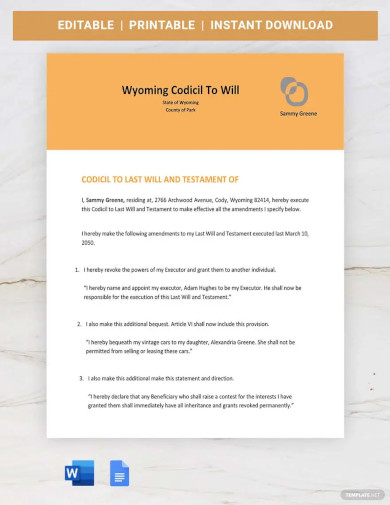
Wyoming Codicil To Will Template
download now -
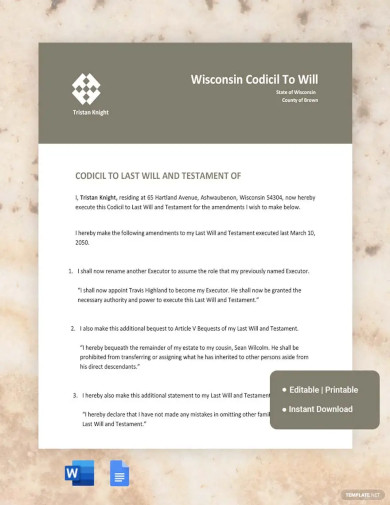
Wisconsin Codicil To Will Template
download now -
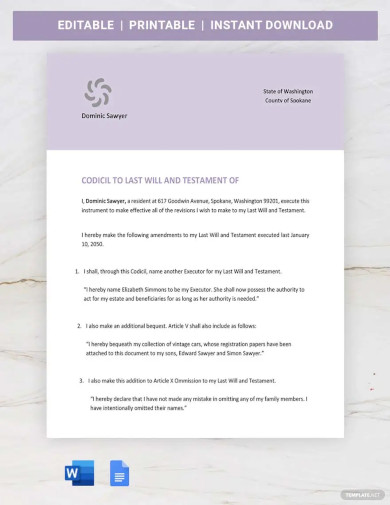
Washington Codicil To Will Template
download now -
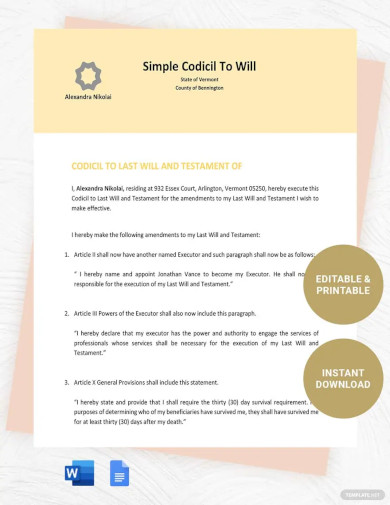
Simple Codicil To Will Template
download now -
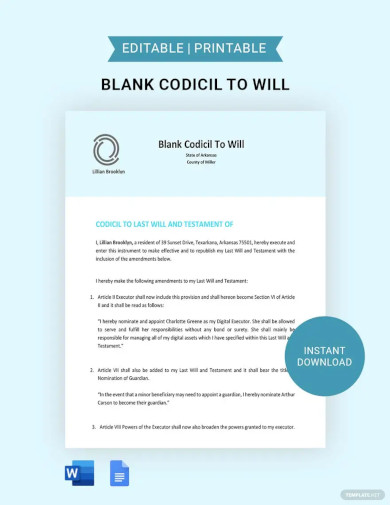
Blank Codicil To Will Template
download now -
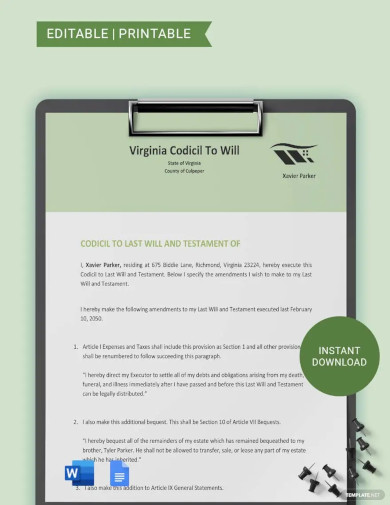
Virginia Codicil To Will Template
download now -
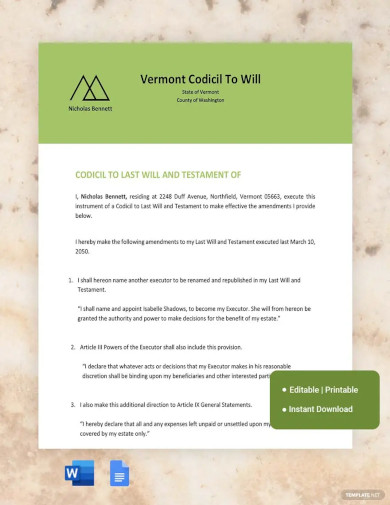
Vermont Codicil To Will Template
download now -
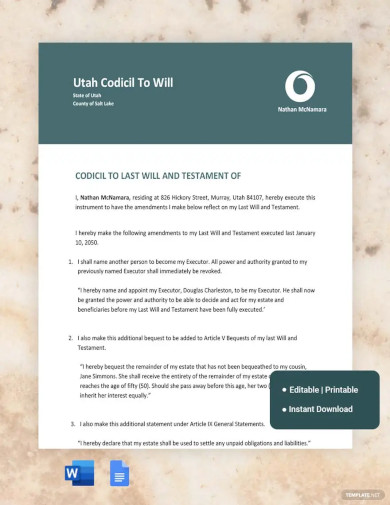
Utah Codicil To Will Template
download now -
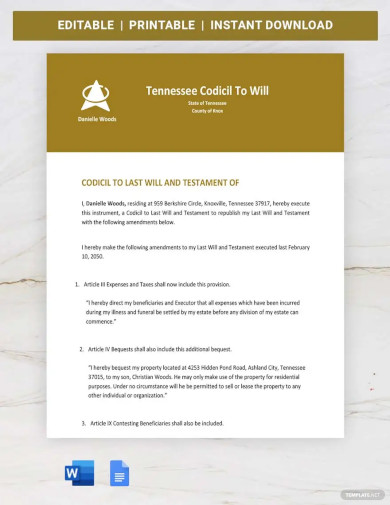
Tennessee Codicil To Will Template
download now -
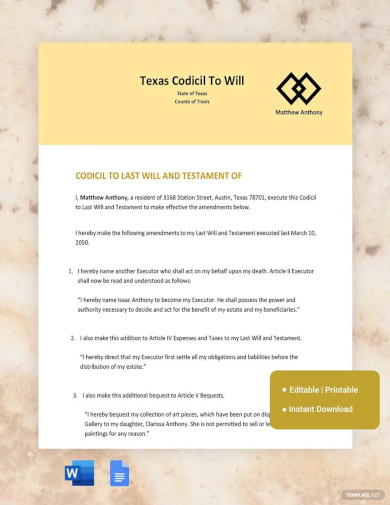
Texas Codicil To Will Template
download now -
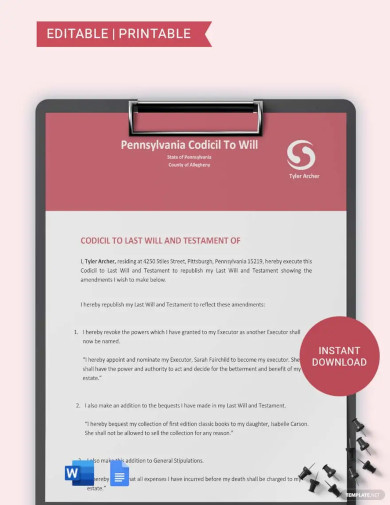
Pennsylvania Codicil To Will Template
download now -
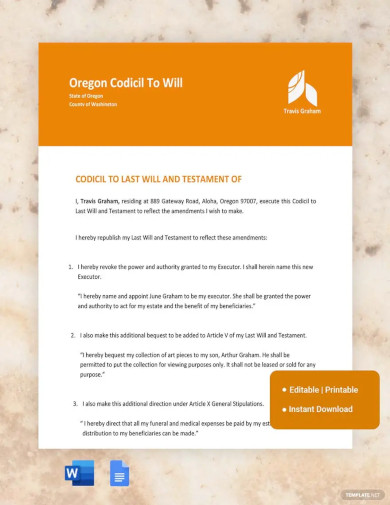
Oregon Codicil To Will Template
download now -
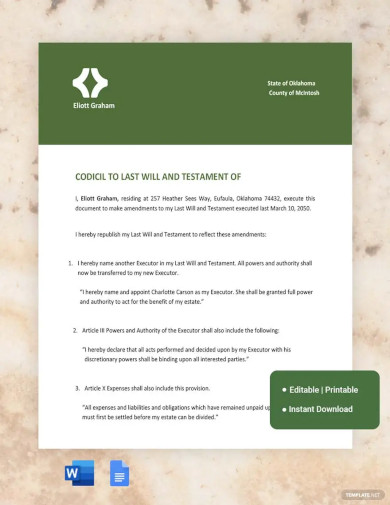
Oklahoma Codicil To Will Template
download now -
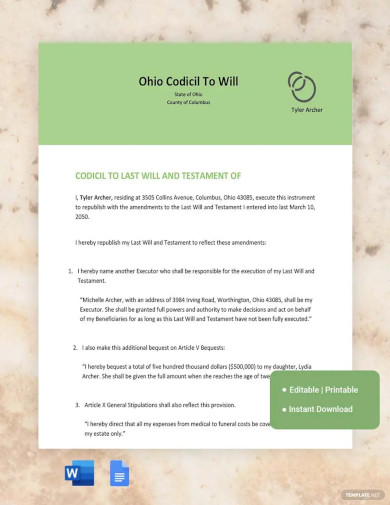
Ohio Codicil To Will Template
download now -
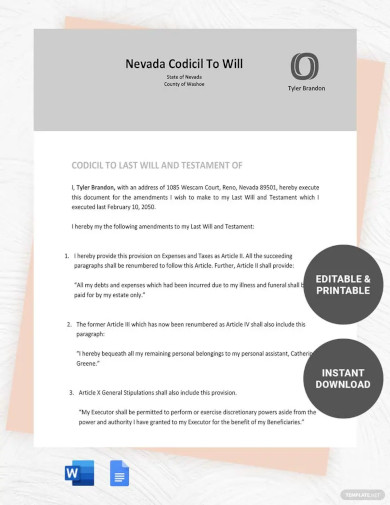
Nevada Codicil To Will Template
download now -
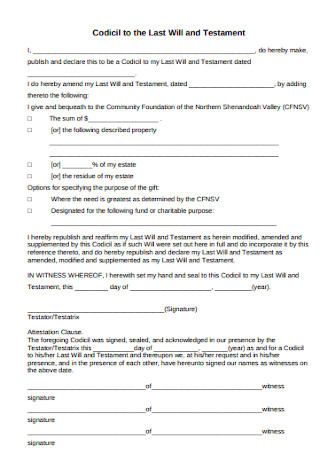
Codicil Last Will and Testament
download now -
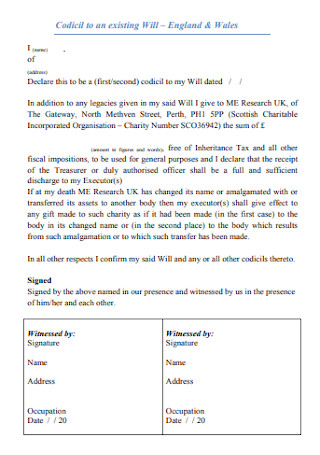
Codicil to an Existing Will
download now -
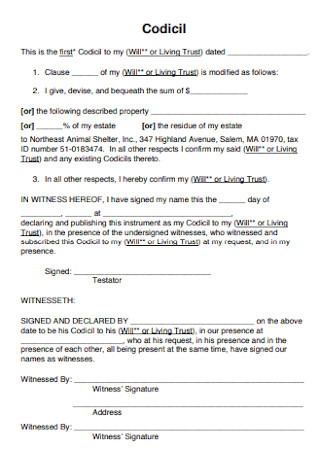
Living Trust with a Codicil to Will
download now -
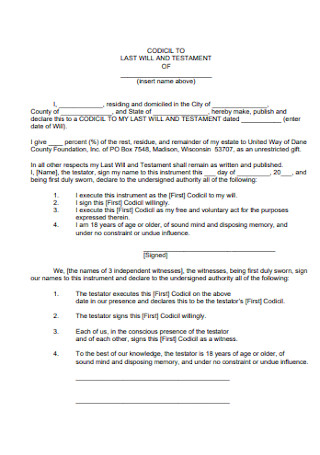
Printable Codicil to Last Will Template
download now -
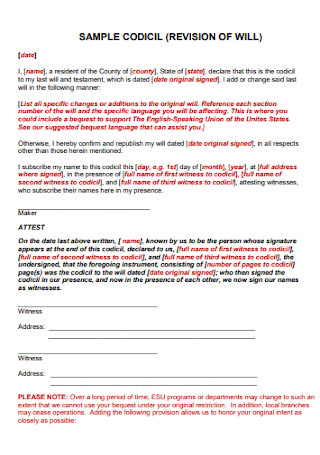
Sample Codicil Revision of Will
download now -
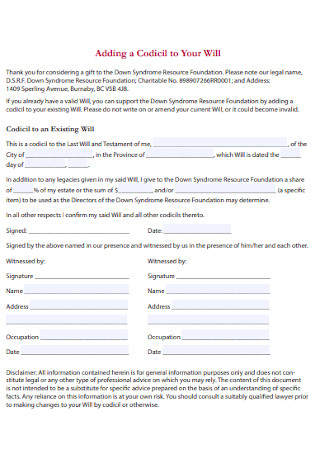
Adding a Codicil to Your Will
download now -
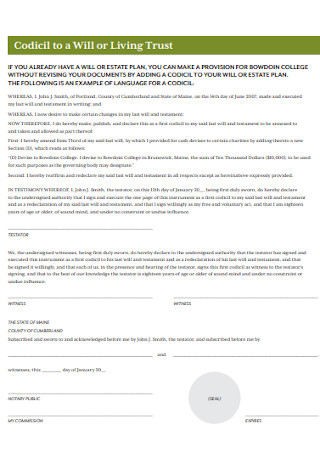
Codicil to a Will or Living Trust
download now -
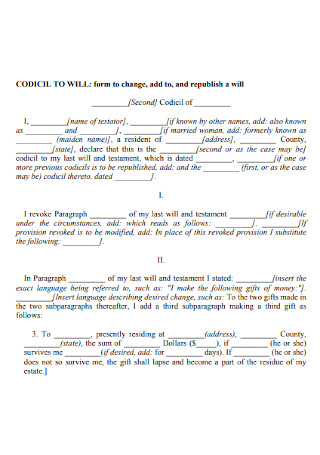
Codicil to Will Format
download now -
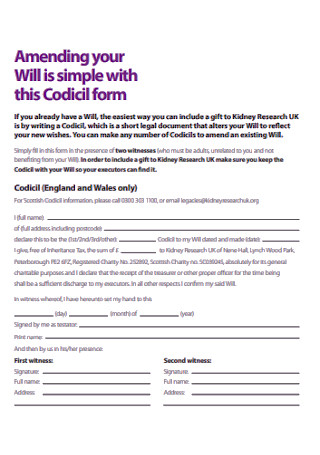
Simple Codicil Will Form
download now -
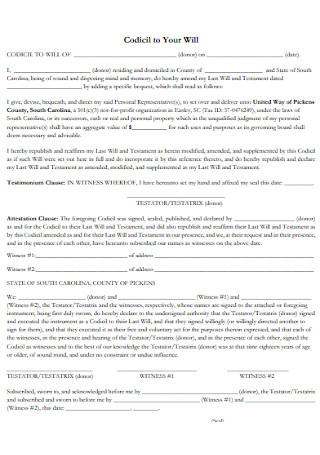
Formal Codicil to Your Will
download now -
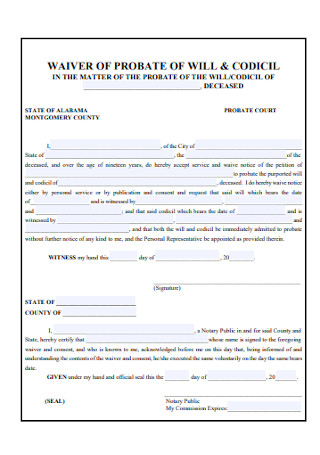
Waiver of Probate of Will and Codicil
download now -
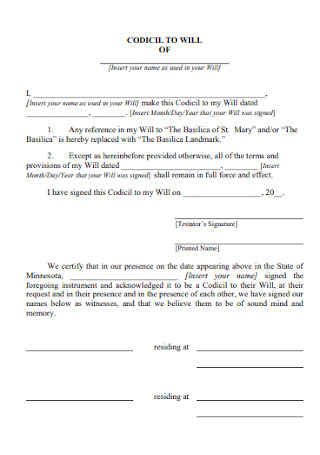
Standard Codicil to Will
download now
FREE Codicil to Will s to Download
31+ Sample Codicil to Will
What Is a Codicil to Will?
Benefits of Making a Codicil To Will
How To Create a Codicil To Will?
FAQs:
What are the dangers of adding a codicil to a will?
When Should You Make a New Will?
What kind of things can you put in a Codicil?
Is it Possible for Me to Write My Own Codicil?
One of the most critical components of the Estate Planning process is drafting a clear, effective, and legal Will. This is because your Will determines your (and your family’s) future once you pass away. It’s vital that your Will be as simple as possible in order for it to be upheld in probate court and for your final desires to be carried out exactly as you intended. So, how can someone make changes to their Will during the course of their life (which is unavoidable) and be confident that those changes will be legally recognized? A codicil to Will is one option. Have you ever heard of this procedure? That’s fine! We will slowly discuss what a Codicil to Will is so that you’ll have an idea of what it is and how you are going to make it. Are you looking for printable templates that you can use as a Codicil to Will? Scroll down below to choose across our templates and to know more about this legal document.
What Is a Codicil to Will?
A codicil is a legal document that specifies any changes or additions to your previous Will and Testament. If you need to amend a part of your Will for whatever reason — such as adding new arrangements or removing old ones — a codicil is a simple way to do so. Consider a codicil (which can be an addition to your Will or a completely new document) as a means to keep your Will current and reflective of your current wishes. A codicil is a document that goes along with your last will and testament. It allows you to make modifications to your will without having to completely redo the original document.
In the days before personal computers, codicils were more common. Making a new will used to entail rewriting the entire document from scratch, which may take a long time. Because you only had to rewrite the areas you wished to update, codicils might make this process go faster. Codicils have grown less prevalent as it has become easier to alter your will utilizing online resources. They can, however, be a handy tool to make minor changes to your will, depending on your preferences.
A codicil is a document that modifies a portion of your existing will while leaving the remainder intact. They are distinct from the will itself and must be kept in the same location as your will. This ensures that your executors are aware of any modifications you make when you settle your estate. You can have your codicil written by a solicitor or other legal professional, or you can write it yourself. In most circumstances, though, it is more practical to prepare a fresh will. If a codicil makes significant changes to a will, the court may intervene to assist in the administration of your inheritance. If the original will has several codicils, this is more likely.
A codicil to a will allows you to make changes to your will without having to write a new one. A codicil is a written document that explains how to amend your will precisely. A codicil, for example, can be used to name a new executor or to give a specific item to someone who wasn’t named in your original will. Codicils are no longer as common as they once were. Wills used to be drafted by hand, and any slight modification required meticulously rewriting the entire document. Codicils make it easy to change the terms of a will. Even when wills were written on typewriters, this remained true.
Some individuals believe that a codicil is a means to change a will without having to hire a lawyer. A codicil, on the other hand, isn’t always the ideal option to amend your will. Codicils, especially if they’re vague or signed incorrectly, can sometimes cause more difficulties than they solve. Making a small adjustment to a recent will is the ideal approach to use a codicil. If your sister and brother-in-law were listed as guardians for your children but have since divorced, you could utilize a codicil to name only your sister as guardian.
However, codicils have drawbacks, and many estate planning attorneys choose to draft a new will instead. There are several reasons why a new will might be a better option:
- A new will has emerged. Although the first codicil to your will may be simple to comprehend, multiple codicils might become difficult and contradictory.
- It’s possible that the codicil will become severed from the original will.
- If your will is ancient, it may contain legal wording that is no longer valid. Your state’s current estate and trust laws will be reflected in a new document.
Remember that the aim of your estate plan is to carry out your desires and safeguard the people you care about when selecting a codicil. Divorce, remarriage, or the birth of your first child all necessitate the creation of a new will and other estate planning paperwork. This guarantees that your estate strategy accomplishes your objectives.
Benefits of Making a Codicil To Will
The main advantage of utilizing a codicil over drafting a new will is expense. A codicil is substantially less expensive than drafting a completely new will. If the modifications a person wants to make are significant, however, creating a new will is a better option. There are several situations that may necessitate the use of a codicil to a will. Perhaps you’ve reached a new milestone (marriage, the birth of a child, or the arrival of grandkids) and wish to update your existing Will. Perhaps you’ve acquired extra properties or assets that you intend to bequeath to your heirs. There are various things you can do with a codicil, regardless of your motivation:
How To Create a Codicil To Will?
Because the regulations on codicils differ from state to state, it’s a good idea to consult an attorney to confirm that the process of modifying your will is legitimate. While you can hand-write your codicil in some states, it’s more likely to be challenged in others; as a result, it’s usually best to type the codicil in the same manner as the will. The basic, step-by-step instructions for adding a codicil to your will are as follows:
1. Make a new document
If you’re working with an attorney, they’ll take care of typing up the codicil in accordance with state laws. If you’re writing your own codicil, pay attention to the language you use and be as specific as possible. Specify which part of your will you’re amending on a new document; remember, the codicil is only for amending a portion of your will, not the entire will. Use the following wording in the codicil:
- I, (name)
- a resident of (County and State)
- declare that this is the codicil to my last will and testament
- which is dated (year and month and year) (date of original will)
- The following is how I add (or change) the last will dated (date): (changes)
You have to include the following necessary information to make your codicil to will formal and valid.
- Your complete name and mailing address – This makes it apparent that the codicil is yours.
- The date – This informs the court about which documents the codicil affects. If you made a codicil for an existing will and then wrote an entirely new will two years later, your old codicil would be irrelevant.
- A declaration that you are of sound mind and are not being influenced by others.
2. Indicate the Amendment
Follow the above text in number 1 with the changes or additions you’re making to the codicil in as much detail as possible, noting the particular sections to be modified. Anything in the Will can be changed with a codicil. Personal representatives, executors, beneficiaries, and any other portion of the estate transfer are examples. Make a list of the sections and wording that should be updated. The Codicil requires that the specified portions be referenced.
3. Clarify your intentions
Include a phrase explaining your previous will and how, aside from the codicil, it is still your goal that the original will be regarded as genuine.
4. Affirm and Sign
With text along these lines above your dated signature, confirm that the codicil is actually your wish: This date (date) at (date) at (date) at (date) at (date) at (date) at ( (address where signed). If your state requires witnesses, this is where you’ll list the people who observed your codicil signature. The paper will also be signed by the witness(es). If your state requires that your codicil be notarized, you should sign it in the presence of the notary. Witnesses and notarization can aid in the avoidance of conflicts, especially if the will or codicil (or both) is holographic.
5. Keeping It Safe
Keep a copy of your signed codicil in the same place as your will for your records. You should also give a copy of your will to your chosen executor, who should have a copy of your will as well.
FAQs:
What are the dangers of adding a codicil to a will?
A codicil is more likely to be misplaced or lost than a fresh will because it is a separate document. Using a codicil to make major changes to a will is regarded as bad legal practice, so if you wish to modify the way your property is handled, it may be easier to draft a new will. If you’re making several modifications over time, it’s also easier to write a new will.
When Should You Make a New Will?
If you want to make a significant or comprehensive modification to the structure of your will, or if the impact of your changes would be unclear if you merely utilized a will codicil, you should create a new will. For example, if you wish to add a trust to your will that didn’t have one before, you’ll need to establish a new will. Because such a modification would affect so many other clauses in the will, it would be easier to simply write a new one.
What kind of things can you put in a Codicil?
What can be included in a Codicil to a Will is not restricted by law. Changes to executors, assigning an additional executor to be responsible for your social media and other online accounts, modifications to specific assets that you have bequeathed to others, and specifying who should take care of your pets after your death are some of the items that frequently involve Codicils.
Is it Possible for Me to Write My Own Codicil?
While you are permitted to draft a codicil on your own, it is preferable to work with an estate planning attorney. They’ll make sure you don’t make any legal errors and that the codicil follows all local, county, state, and federal laws. Estate planning attorneys can also assist you in determining whether you need to make any additional changes to achieve your legal goals.
While many components of a will may not change as you move through life, other things may, forcing you to make adjustments. Some people choose to write a codicil instead of completely amending their will. A codicil is a legal document that adds to an existing will. While it may be preferable to revise your complete will, a codicil may be a more expedient and cost-effective option. Download now our templates for your Codicil To Will!
